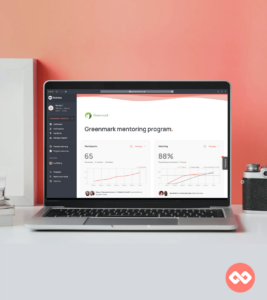Mentorloop Co-Founder and CEO Lucy Lloyd reflects on 2022, looks ahead to the themes and trends she sees emerging for 2023, and how mentoring can be the key to navigating this new world of work.
At the start of 2022, we returned from 2 years of pandemic disruption optimistic about the green shoots of reconnection, pushing the return to work, and excited about the re-emergence of our workplaces, industry bodies and communities as a force for reconnection in our lives. Then that optimism floundered through 2022, and disruptions in HR and industry membership continued – talk of recession, global uncertainty, “The Great Resignation”, “The Great Re-Entry”, “quiet quitting” etc. – which contributed to a wait-and-see approach to people strategy, a paralysis on the part of companies and communities to start something new for their people or their members.
Plunging into the new year has had a different flavor in 2023. At Mentorloop, we’re lucky enough to work with some of the most people-focused and future-ready companies in the world, and we’re hearing a few key mentoring trends and themes about how great leaders are positioning their people strategy for the year ahead.
Belonging is the New Inclusion
The theme of “Belonging” is so hot right now. Specifically, the role companies and member organizations can play in creating workplaces and industries that foster a feeling of belonging. Importantly, “belonging” does not mean assimilation (it’s not about creating a mono-culture), but rather intentionally creating a space where everyone is comfortable enough to be themselves. When we’re free to be ourselves, we can be our best selves.
And this isn’t just the domain of Human Resources – thriving future-proofed companies are co-designing their employee experience with their entire teams, for example by building hybrid workplaces that can work for everyone. A company where everyone can belong becomes a company that operates like a community – a social structure with benefits beyond just a place to draw a salary – and is a compelling advantage for attracting and retaining great people.
How You Can Build a Culture of Belonging
Mentorloop’s equitable matching algorithm democratises mentoring by ensuring there is an equal opportunity for all and your DEI & belonging strategies are considered in the process. Our remote-first approach to mentoring program design supports an ever-changing working environment that doesn’t discriminate based on location and/or access, bringing people together across technological and geographical divides. Our platform integrations continue to expand with tools such as Slack, Zoom, Google Meets and MS Teams supported, so people can engage in mentoring in any way that works for them.
Self-determination Takes a Village
The traditional career progression model is a relic of the past. Career pathways are no longer linear – we’re more likely to take some sideways steps, to pursue opportunities that align with our own personal “why” rather than with our experience, and we undertake more transitions in our careers – whether from job to job or to another industry.
Intentionally building a workplace or community that fosters opportunities for connection, or makes them visible, encourages people to drive their own development, and importantly to picture a longer-term career path within that “village”.
You Have More Opportunities Than You Realise
There are likely tens of thousands of potential connections sitting under your nose in your organisation or membership base. If we look at a group of four people, there are six unique relationships that can form.
In a group of 1150, that expands to over half a million possible connections that can form.
We’ve made it easier than ever for employees or members to connect with those around them that can help them feel included, guided and their best selves. We’re dedicated to building personal advisory boards and this is why our platform will never charge to engage in several different relationships at once.
Open Up Access to People Data
We’re seeing more and more leadership roles exclusively dedicated to the “Future of Work” – i.e. predicting trends and prescribing practices that ready workplaces for the next evolution. At Mentorloop, we don’t think it’s about a specific new role, but making data-led decision-making available to all managers, team leads and employees, not just executive leadership.
People analytics – measuring employee engagement, understanding behavior/productivity in a remote world, monitoring engagement and retention – is an established practice for HR professionals, but what if we could empower all people leaders with the data to help them contribute to culture and belonging? Easy access to qualitative data – like satisfaction and sentiment – becomes vital particularly when it comes to balancing the productivity gains of in-person collaboration, with the personal gains of remote work. Which brings me to…
Focusing on the Five Key Indicators of Program Success
Our new Program Coordinator dashboard surfaces the metrics that matter, making it easier than ever to manage your program, share reports and surface highlights. Infographics to better visualise your cohort are soon to follow, bringing together the art and science of measuring programs with Sentiment – surfacing balanced data to both Program Coordinators and Participants, so everyone has their finger on the pulse.
Hybrid Is Hard
The hybrid working model – some of us in the office, some of the time – has gone mainstream, but even the most people-first companies are finding it difficult to get exactly right. We’ve pretty much moved past the “can we trust people to be productive working from anywhere?” issue, but there’s still uncertainty. How can people leaders best balance the personal benefits (happiness, flexibility, work-life balance), with other valuable experiences like connection and collaboration (and productivity!)?
For people in the early stages of their careers, getting this balance right is critical. So much of our early career development is picked up almost by osmosis – hearing conversations, observing conflict resolution, shadowing the experts. We can’t learn in a vacuum, so in the absence of the organic opportunity for connection, visible access to peer and senior mentoring encourages social learning and accelerates the community-building essential to building a workplace of belonging in a hybrid world.
Supporting a Spectrum of Mentoring Relationships
Supporting the variety of forms that mentoring comes in has always been second nature to us. The rise of Peer Mentoring, Reverse Mentoring and Cross-Geographical Mentoring programs are only on the rise. Ensuring mentoring is paired with each employee lifecycle stage is also surfacing – such as connecting employees early, as part of their onboarding. Encouraging participants to be both mentor and mentee is woven into our ethos, and strengthening social ties with the water cooler experience that comes with Group Loops.
At Mentorloop we’re experiencing these mentoring trends internally as a company, but also as input and motivation to develop the world’s number one mentoring platform. Belonging is a natural outcome of mentoring and of a well-designed mentoring program, as it enables people to connect across geographical or departmental silos, and can be offered to everyone in a hybrid working world. Mentorloop enables everyone to build their own personal advisory board, and self-drive their own career journey. And in 2023 we’re continuing to improve the people analytics generated by Mentorloop, particularly the sentiment data mentoring programs can naturally reveal about an organization’s culture.
We’d love to hear from you – let us know what mentoring trends you’re seeing in the people space in 2023 by connecting with us on LinkedIn!




